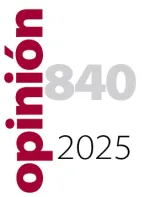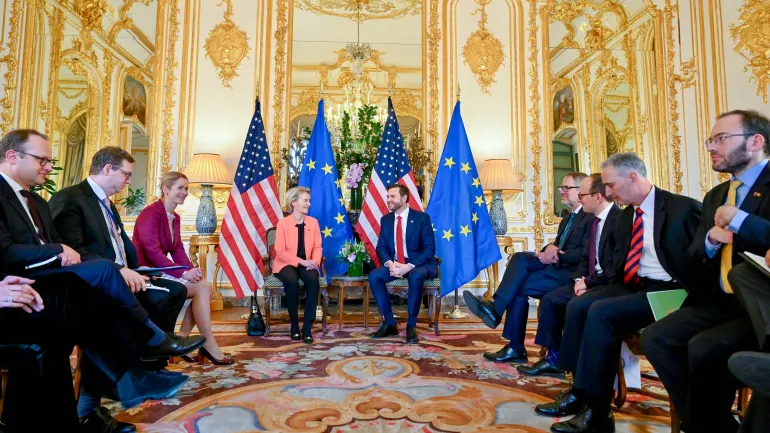The European Emperor has no clothes


The United States have turned from a benevolent hegemon to an imperial player. Since the European Union had convinced itself that the overarching values on both sides of the Atlantic were shared, Donald Trump’s doctrine has exposed the EU's weaknesses. By bowing to the Netanyahu and Trump’s logic of preventive war, European powers are complicit in destroying the rule of international law they have built since 1945 and lost any influence on shaping the new architecture of the Middle East.
On 21st June 2025 the US joined Israel in its bombing campaign against Iran by dropping bunker busting bombs on the country’s nuclear sites. US President Donald Trump’s decision came barely twenty-four hours after “negotiations” in Geneva between the foreign ministers of Germany, France and Great Britain and their Iranian counterpart whose purpose was to deescalate the “preventive” war launched by Israel against Iran on 13th June. European leaders did not simply look foolish, they looked duplicitous. Following US attacks, Emmanuel Macron, Friedrich Merz and Keir Starmer issued a joint statement urging Iran not to take any further action that could destabilize the region. The German chancellor even appeared to give the game away on June 17th when he quipped that “Israel was doing the West’s dirty work”. Never in the history of Europe since the Second World War have the foreign ministers of three biggest European powers, two of which have atomic weapons, been made to look so foolish. Trump has eagerly joined an Israeli script he did not write but in which he is determined to star. Europe does not even have a walk on part.
The European emperor has no clothes. Europe has no mind of its own on the Middle East because it seems incapable of thinking, let alone acting with any autonomy from the US. Leading European governments have yet to turn the page on eighteen months on what Nathalie Tocci calls “complicity with the Israeli government’s war crimes in Gaza”. They have yet to denounce in unequivocal words humanitarian initiatives brokered by the US and Israel that breach humanitarian principles painstakingly built since 1945. In the words of the former US negotiator with Iran, Robert Malley, both the US and the EU have “slavishly followed (Israel) and let themselves be convinced of the logic of preventive war”. No European leader has condemned the Israeli/US strikes on Iran.
The broader context of western interventions, not least in the modern history of the Middle East underlines the doubts generated by this military action. As the Iranian-American analyst Karim Sadjadpour states, “anyone who has observed the last two decades of history in the Middle East would think hard about unleashing such an attack. You would want to think several steps ahead, and there is no evidence the president [Trump] has done that.” Sadjadpour questions himself: Will this US-Israeli military campaign against Iran have prevented an Iranian bomb or entrenched it? Has it hastened the demise of the regime, or has it entrenched it?
And, as Ethan Chorin reminds us “the US is no innocent bystander in creating and feeding the Islamic regime, from its involvement in the 1953 overthrow of Iranian prime minister Mohammad Mossadegh (the UK was fully complicit) to failing to support the Iranian street when it rose up in 2009”.
Nor do military successes necessarily translate into political success as the US and US/European military campaigns in Afghanistan, Iraq and Libya extensively demonstrate. The combination of the Israeli prime minister, Benjamin Netanyahu’s persistence and the Iranian president, Ali Khamenei’s defiance may have transformed Donald Trump from a self-proclaimed peacemaker into a warmonger, but what is striking about the foreign policy of European powers is that leaders in London, Berlin and Paris do not allow for any debate on the Middle East in their respective parliaments yet do not shy from criticising successive US presidents from doing the same.
Europe has in the recent past insisted that the Iranian question could only be solved by diplomacy. Earlier this century, European negotiators invented the E3/EU format which included diplomats from the UK, France and Germany, together with the EU High Representative to mediate on Iran’s nuclear file. Today no leading European leader dares denounce the bombing of Iran as a breach of Article 2 of the UN charter and the additional protocol to the Geneva conventions (article 56) which specifically prohibits attacks against a state’s nuclear facilities. Pre-emptive strikes cannot be legitimised even if one accepts the need to uphold Israel’s right to self-defence.
The cardinal sin of Europe is that since WW2 it has always viewed the world through Transatlantic lenses. It never envisaged that US and European interests might diverge. Twenty years ago, Herfried Münkler warned that “the real challenge for the European Union was (and is) that, on the one side, it faced an area in which all the conflicts and instability typical of a post-imperial era were developing at great speed, while on the other side the Western ‘number one’, which until then had acted as a benevolent hegemon, was turning into an imperial player that paid scant regard to the wishes and ideas of its allies.” Europe used aid, trade, diplomacy and sanctions to support US foreign policy goals. It convinced itself that the overarching values on both sides of the Atlantic were shared. Trump’s foreign policy is a wrecking ball but, as the US invaded Iraq in 2003, French president Jacques Chirac and German chancellor Gerhard Schroder grasped the true nature of US policy in the Middle East better than their successors.
The fact that Europe has no mind of its own and is actively undermining the rule of international law is welcome news for Russian president Vladimir Putin and his war of attrition against Ukraine. It is weakening European policy across the world and destroying what is left of EU’s pretence to be upholding democratic values. It will earn us no favour in Washington but scorn and no standing in Israel whose leaders are quick to call European leaders antisemites when they dare criticise Netanyahu’s scorched earth policy carried out with impunity under the US umbrella. Natalie Tocci argues that “war, chaos and nuclear proliferation in the Middle East are more consequential for Europe than for the US” but a growing doxa on the Middle East and Russia has stifled public debate on the old continent since the turn of the century. New ideas cannot flourish among elites who are so ignorant of history.
Keywords: EU, US, Iran, Middle East, Trump, Netanyahu, France, Germany, UK, Foreign Policy, preventive war, E3/EU, diplomacy, Russia
All the publications express the opinions of their individual authors and do not necessarily reflect the views of CIDOB or its donors
Image: © European Union, 2025